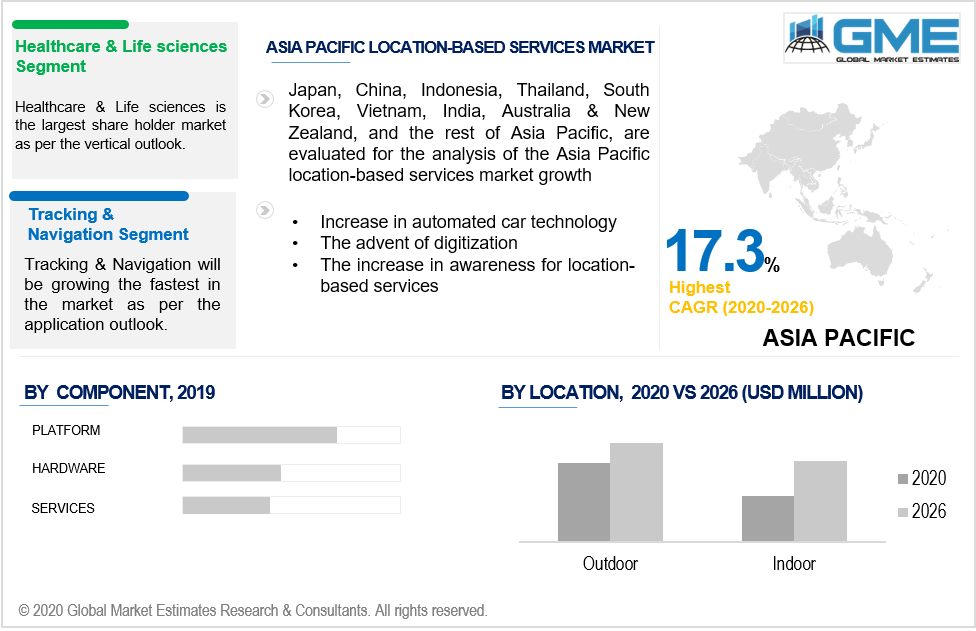
Location-Based Services Market Size, Trends & Analysis - Forecasts to 2026 By Type of Solution (Platform, Hardware, and Services [Deployment & Integration, Application Support & Maintenance, and Consulting & Training]), By Type of Location (Indoor and Outdoor), By Type of Application (Tracking & Navigation, Marketing & Advertising, Location-based Social Networks, Location-based Health Monitoring, and Others [location-based gaming and emergency support]), By Type of Vertical (Transportation & Logistics, Retail, Government, Tourism & Hospitality, Manufacturing, Healthcare & Life Sciences, Media & Entertainment, and Others [Energy & Utilities, BFSI, Telecom, and Education]), By Type of Region (NA [North America], Europe, APAC [Asia Pacific], MEA [the Middle East & Africa], and CSA [Central & South America]), End-User Landscape, Vendor Landscape, Company Market Share Analysis & Competitor Analysis
Location-Based Services provide an extensive range of opportunities due to their capability to provide information based on a particular location. LBS practice a real-time location monitoring system to help keep track of the geographical location of the desired place. COVID-19 has affected the market and has been witnessing a perpetual sag in the growth as processes were suspended in varied enterprises due to global lockdown, yet it is prophesied to obtain an excellent rise in the outlook time.
According to the analysis conducted by GME, the Location-Based Services market is intimated to depict a pre-eminent accretion of 17.1% during the forecast period (2020-2026).
Strict government laws and regulations are the primary impediments of the market whereas, an increase in social media applications, a rise in smartphone usage, demand for location-based applications are the drivers accentuating the global market.

The platform, hardware, and services are the types of components in the global market where deployment & integration, application support & maintenance, and consulting & training are the types of services. In the services segment, application support & maintenance is predicted to grow upwards in the given timeframe. An increase in investments and funding is one of the most significant factors to consider concerning the augmentation of the market.
Based on the type of location, indoor and outdoor is the market categorization of the global market. The outdoor segment will be growing rapidly in the aforementioned period. Easy internet accessibility is the accelerator for thriving the extension of the global market.
Based on the application, location-based social networks, location-based health monitoring, tracking & navigation, marketing & advertising, and others (location-based gaming & emergency support) are the classifications of the location-based services market. The tracking & navigation segment is predicted to grow in the forecast period. The increase in penetration of the 4G/5G data network is the major influencer towards the addition of the global market which is then assisted by the progress in the production of automated gadgets in the APAC region.
The market categorization based on verticals is tourism & hospitality, manufacturing, healthcare & life sciences, media & entertainment, transportation & logistics, retail, government, and others (energy & utilities, BFSI, telecom, and education). Healthcare and life sciences are the highest revenue patron for the forecast period due to the increment in healthcare expenditure which is directly proportional to the increase in demand for smart healthcare tools and wearable accessories.

Based on the regional analysis, the Asia Pacific region will enhance and propel the market growth in the coming years. The increase in automated car technology, the advent of digitization, and the increase in awareness for location-based services are the dominant propellor of the global location-based service market.
Google, Esri, IBM, Oracle, Teldio, Cisco, HERE, Ericsson, Navigine, AiRISTA Flow, Quuppa, Foursquare,Microsoft, Aruba Networks Ubisense, Apple, TomTom, Qualcomm, and other industries are the dominant players in the global location-based services market.
Please note: This is not an exhaustive list of companies profiled in the report.
In October 2019, Qualcomm signed an agreement with ISRO to strengthen the geospatial capabilities of mobile and IoT solutions.
In February 2019, Microsoft collaborated with TomTom to consolidate LBS in Azure solutions.
We value your investment and offer free customization with every report to fulfil your exact research needs.
The Global Location-Based Services Market has been studied from the year 2017 till 2026. However, the CAGR provided in the report is from the year 2018 to 2026. The research methodology involved three stages: Desk research, Primary research, and Analysis & Output from the entire research process.

The desk research involved a robust background study which meant referring to paid and unpaid databases to understand the market dynamics; mapping contracts from press releases; identifying the key players in the market, studying their product portfolio, competition level, annual reports/SEC filings & investor presentations; and learning the demand and supply side analysis for the Location-Based Services Market.

The primary research activity included telephonic conversations with more than 50 tier 1 industry consultants, distributors, and end-use product manufacturers.

Finally, based on the above thorough research process, an in-depth analysis was carried out considering the following aspects: market attractiveness, current & future market trends, market share analysis, SWOT analysis of the companies and customer analytics.

Tailor made solutions just for you
80% of our clients seek made-to-order reports. How do you want us to tailor yours?
OUR CLIENTS